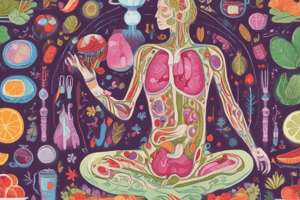Podcast
Questions and Answers
What is the primary function of carbohydrates in the body?
What is the primary function of carbohydrates in the body?
To provide energy to the body
What are proteins essential for in the body?
What are proteins essential for in the body?
Growth, maintenance, and repair of body tissues
What are the two types of vitamins?
What are the two types of vitamins?
Fat-soluble and water-soluble
What is the purpose of the Dietary Reference Intake (DRI)?
What is the purpose of the Dietary Reference Intake (DRI)?
What is the main goal of the MyPlate guide?
What is the main goal of the MyPlate guide?
What is malnutrition, and what can cause it?
What is malnutrition, and what can cause it?
What is obesity, and what are the main factors that contribute to it?
What is obesity, and what are the main factors that contribute to it?
What are some examples of disorders related to nutrient deficiencies?
What are some examples of disorders related to nutrient deficiencies?
Flashcards are hidden until you start studying
Study Notes
Macronutrients
- Carbohydrates:
- Primary source of energy for the body
- Found in grains, fruits, vegetables, and dairy products
- Broken down into glucose, which is used by the body for energy
- Proteins:
- Building blocks of tissues, organs, and cells
- Necessary for growth, maintenance, and repair of body tissues
- Found in animal products, legumes, nuts, and seeds
- Fats:
- Provide energy and help absorb vitamins
- Found in animal products, nuts, seeds, and oils
- Essential fatty acids (omega-3 and omega-6) cannot be produced by the body and must be obtained through diet
Micronutrients
- Vitamins:
- Essential for energy production, immune function, and growth
- Found in small amounts in a variety of foods
- Fat-soluble (A, D, E, K) and water-soluble (B, C)
- Minerals:
- Important for growth, maintenance, and function of body tissues
- Found in small amounts in a variety of foods
- Examples: calcium, phosphorus, potassium, sodium, iron
Nutrition Recommendations
- Dietary Reference Intake (DRI):
- Established by the National Academy of Sciences to provide guidelines for nutrient intake
- Includes Recommended Dietary Allowance (RDA), Adequate Intake (AI), and Tolerable Upper Intake Level (UL)
- MyPlate:
- US Department of Agriculture's guide for healthy eating
- Recommends dividing plate into four sections: fruits, vegetables, grains, and protein
- Encourages variety, portion control, and limited intake of added sugars and saturated fats
Nutrition-Related Disorders
- Malnutrition:
- Inadequate nutrient intake, leading to impaired function and health
- Can be caused by inadequate diet, digestive disorders, or increased nutrient needs
- Obesity:
- Excessive body fat, leading to increased risk of chronic diseases
- Caused by consuming more calories than the body needs, paired with lack of physical activity
- Disorders related to nutrient deficiencies:
- Examples: scurvy (vitamin C deficiency), rickets (vitamin D and calcium deficiency), anemia (iron deficiency)
Macronutrients
- Carbohydrates are the primary source of energy for the body, found in grains, fruits, vegetables, and dairy products, and broken down into glucose for energy.
- Proteins are the building blocks of tissues, organs, and cells, necessary for growth, maintenance, and repair of body tissues, and found in animal products, legumes, nuts, and seeds.
- Fats provide energy and help absorb vitamins, found in animal products, nuts, seeds, and oils, with essential fatty acids (omega-3 and omega-6) that cannot be produced by the body and must be obtained through diet.
Micronutrients
- Vitamins are essential for energy production, immune function, and growth, found in small amounts in a variety of foods, and include fat-soluble (A, D, E, K) and water-soluble (B, C) types.
- Minerals are important for growth, maintenance, and function of body tissues, found in small amounts in a variety of foods, and include examples such as calcium, phosphorus, potassium, sodium, and iron.
Nutrition Recommendations
- The Dietary Reference Intake (DRI) is established by the National Academy of Sciences to provide guidelines for nutrient intake, including Recommended Dietary Allowance (RDA), Adequate Intake (AI), and Tolerable Upper Intake Level (UL).
- MyPlate is the US Department of Agriculture's guide for healthy eating, recommending dividing a plate into four sections: fruits, vegetables, grains, and protein, and encouraging variety, portion control, and limited intake of added sugars and saturated fats.
Nutrition-Related Disorders
- Malnutrition occurs when there is inadequate nutrient intake, leading to impaired function and health, and can be caused by inadequate diet, digestive disorders, or increased nutrient needs.
- Obesity is a result of excessive body fat, leading to increased risk of chronic diseases, caused by consuming more calories than the body needs, paired with a lack of physical activity.
- Disorders related to nutrient deficiencies include scurvy (vitamin C deficiency), rickets (vitamin D and calcium deficiency), and anemia (iron deficiency).
Studying That Suits You
Use AI to generate personalized quizzes and flashcards to suit your learning preferences.



